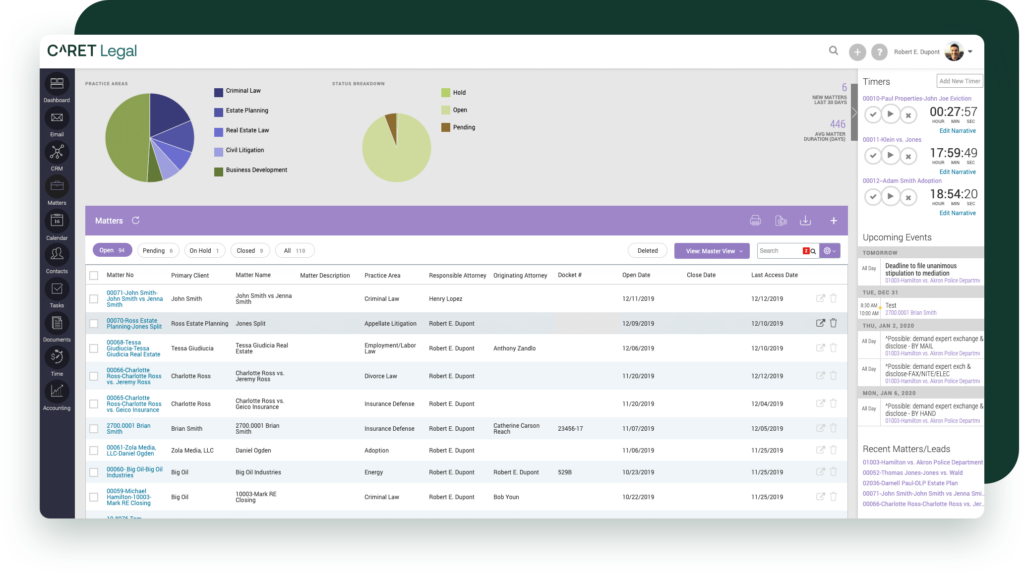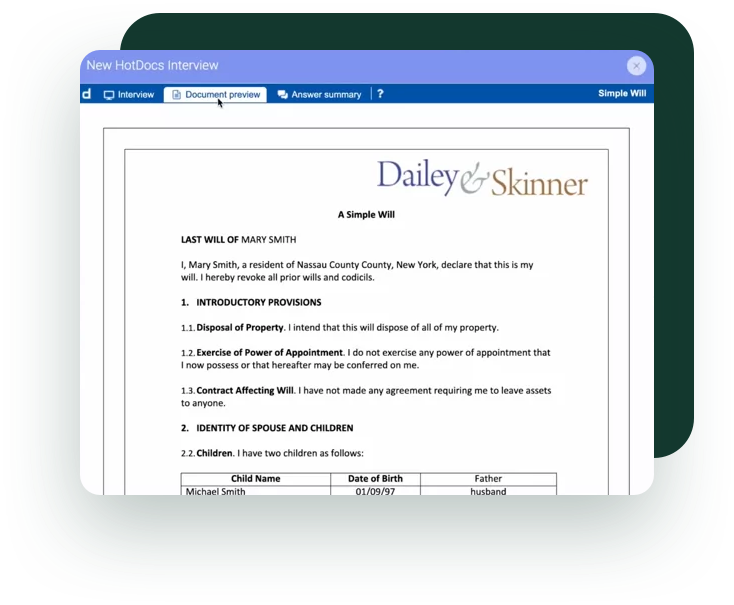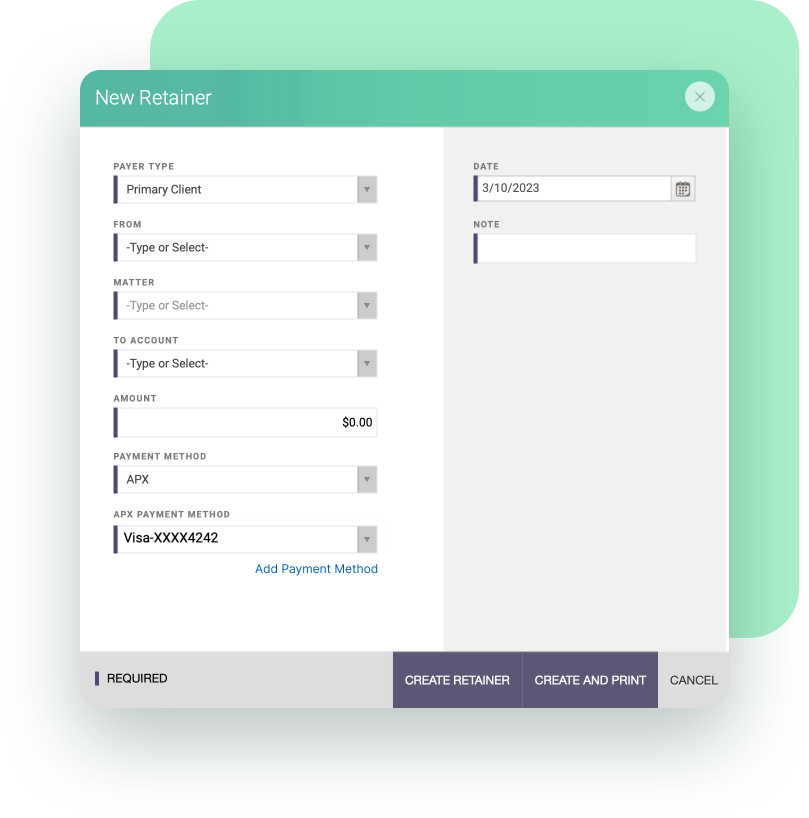A must-have feature of legal practice management platforms, case management software, centralizes all your case files, communications, billing, and scheduling in one platform — it’s truly like having a command center for your law firm.
Legal tech is all about using tech to be more efficient and productive and to serve clients better. We’re at an interesting time where law and tech are coming together to make practicing law more streamlined. Let’s get into the best legal tech and tools your firm needs to start using now.
The Total Command Center
A must-have feature of legal practice management platforms, case management software, centralizes all your case files, communications, billing, scheduling, and matter management details in one platform — it’s like having a command center for your law firm. Law firms can use this software to manage their court calendar, track billable hours and associate them to case records, monitor case progress and manage client relationships.
Legal software plays a critical role in enhancing various tasks such as client onboarding, billing, and using AI tools to streamline workflows without complexity. Carefully selecting the right platforms can significantly improve efficiency.
Industry leading law firm technology also includes document management systems, a secure email client and accounting software to give a full solution for running a law firm. Features like automated reminders can prevent missed deadlines and integrated billing can fortify accurate and timely invoices. The benefits are many. Not only does it save time by centralizing all case related information but it also reduces errors by reducing human errors like misfiled documents, missed deadlines and incorrect billing entries. Accurate time tracking is vital for improving billing processes and law firm profitability.

Track your matters from start to finish
Also it can help law firms serve clients better by having all client information easily accessible and up-to-date. Case delays happen because of lost files or miscommunication. With case management software like CARET Legal, all case files are organized and accessible and communication history can be tracked so all parties are up-to-date and cases move forward more efficiently. It has all these features and is a comprehensive, efficient and user friendly case management solution.
Selecting a New Practice Management System
Download this guide to help you select the right technology for your firm, calculate the total cost of ownership, and understand data migration considerations before making a move.

The Legal Automation Bot
Legal technology with automation can do repetitive tasks like document drafting, client intake, and compliance checks. This reduces manual labor and human errors, which helps improve efficiency and accuracy.
Generative AI can automate tasks like legal drafting and case law research, further enhancing productivity.
Let’s talk about document automation. Document creation has been a manual process but now it can be automated with document automation software. New law firm technology can produce error-free legal documents fast and save time and resources. Also, this document automation helps guarantee accuracy and allows lawyers to focus on the more important aspects of a case rather than being overwhelmed by paperwork.

HotDocs, powerful document automation
But automation isn’t just about creating documents. It’s also about managing workflows, scheduling, and communication. By automating these processes, law firms can streamline their operations and make sure nothing falls through the cracks. This means better client service, more efficient use of resources, and ultimately a more successful law firm.
The Digital Pen
Also document automation and creation tools give rise to “the digital pen”. E-signature tools are revolutionizing the way legal documents are signed and managed, bringing a new level of convenience and efficiency to legal practice. These tools eliminate the need for physical signatures, simplifying the process for both lawyers and their clients. Additionally, e-signature tools allow lawyers to share documents securely with clients, enhancing communication and involvement.
Consider this scenario: a client in a different city, state or even country can now sign legal documents without having to travel. The implications are huge – not only does it save the client’s time but it also cuts down on travel expenses. This is especially useful in cases where multiple signatures from different parties are required, as the process can be done simultaneously without the need for physical meetings.
Legal practice management software is a game-changer, paving the way for increased efficiency and improved client relationships.
E-signature tools also streamline the document review process, ensuring accuracy and efficiency. These tools provide a secure and legally recognized way of signing documents. They use encryption to establish that signatures cannot be tampered with, providing an extra layer of security. In many jurisdictions e-signatures have the same legal weight as traditional signatures, making them an acceptable and efficient alternative in legal practice.
Another important feature of e-signature tools is the audit trail. This means that each signature is accompanied by a full record of who signed the document, when it was signed and sometimes where it was signed. This audit trail is essential as it provides a clear and traceable record of the signing process.
The Online Treasurer
Online payments have become the norm in the legal industry. They provide a convenient and secure way for clients to pay for legal services, better client service and more efficient financial management in law firms. Reliable contact methods and seamless communication solutions are crucial for any business, and online payments play a significant role in enhancing these aspects.
Implementing online payment in a law firm is a simple process. For example, a client can pay their bill at night or over the weekend, not just during office hours. This convenience can greatly improve client satisfaction, especially when combined with effective billing practices that suit client needs. Online payments contribute to better service by providing immediate assistance to clients, reducing the likelihood of missed payments and enhancing overall client experience.

Drive stronger cashflow with online payment processing
Also, online payments provide a record of transactions, making it easier for law firms to manage finances and track payments. Plus, online payments can help law firms improve their cash flow. By making it easy for clients to pay their bills, law firms can reduce their accounts receivable and improve their financial health.
Also, online payments are secure and can reduce the risk of fraud. As we continue to explore the digital transformation of the legal industry, we look into the key areas of identity management and client data protection.
The Data Shield
In the current digital era, keeping client data secure and managing digital identities have become crucial. Law firms are enhancing their security measures with advanced encryption technologies and secure communication channels. This is to maintain client confidentiality, safeguard sensitive legal information, and adhere to data protection regulations.
Utilizing today’s tools enhances efficiency and effectiveness in accessing vital legal information, making it easier for law firms to protect sensitive client data.
Identity management, a trend in legal tech, is all about securely managing digital identities, sensitive data, and access controls in law firms.
By using advanced solutions that handle user authentication, access rights, and activity monitoring, law firms are better positioned to identify and prevent unauthorized access to legal data. This includes using biometric authentication methods like fingerprint scanning and facial recognition. These are a step up from traditional password systems and also make the client onboarding process smoother.
Also, security controls help law firms with compliance. By ensuring that only the right people have access to sensitive data, law firms can reduce the risk of data breaches and comply with regulations like the GDPR. This not only protects the firm’s reputation but also the financial health of the firm.
Meeting Clients’ Digital Expectations and Effectively Adopting New Technology
Your firm’s software should not only increase collaboration and productivity among your staff, but also satisfy your clients’ needs for enhanced security, increased communication and greater efficiency.

Meeting Clients’ Digital Expectations and Adopting New Technology
Your firm’s software should not only increase collaboration and productivity among your staff but also meet your clients’ needs for more security, more communication and more efficiency.
Get Ready for the Future of Legal Tech
The future of law firm technology is exciting. Many firms are currently adopting specific tools and software solutions within the legal sector to enhance productivity and efficiency. More firms are going paperless with e-signature tools, emphasizing the efficiency and environmental benefits these digital solutions provide in legal work. Legal practice management software is a game changer, making way for more efficiency and better client relationships. Each tech innovation sparks the next creating a ripple effect of progress that is changing the way lawyers practice law.
Ready to get into the future of legal tech? Schedule a demo of CARET Legal today.
